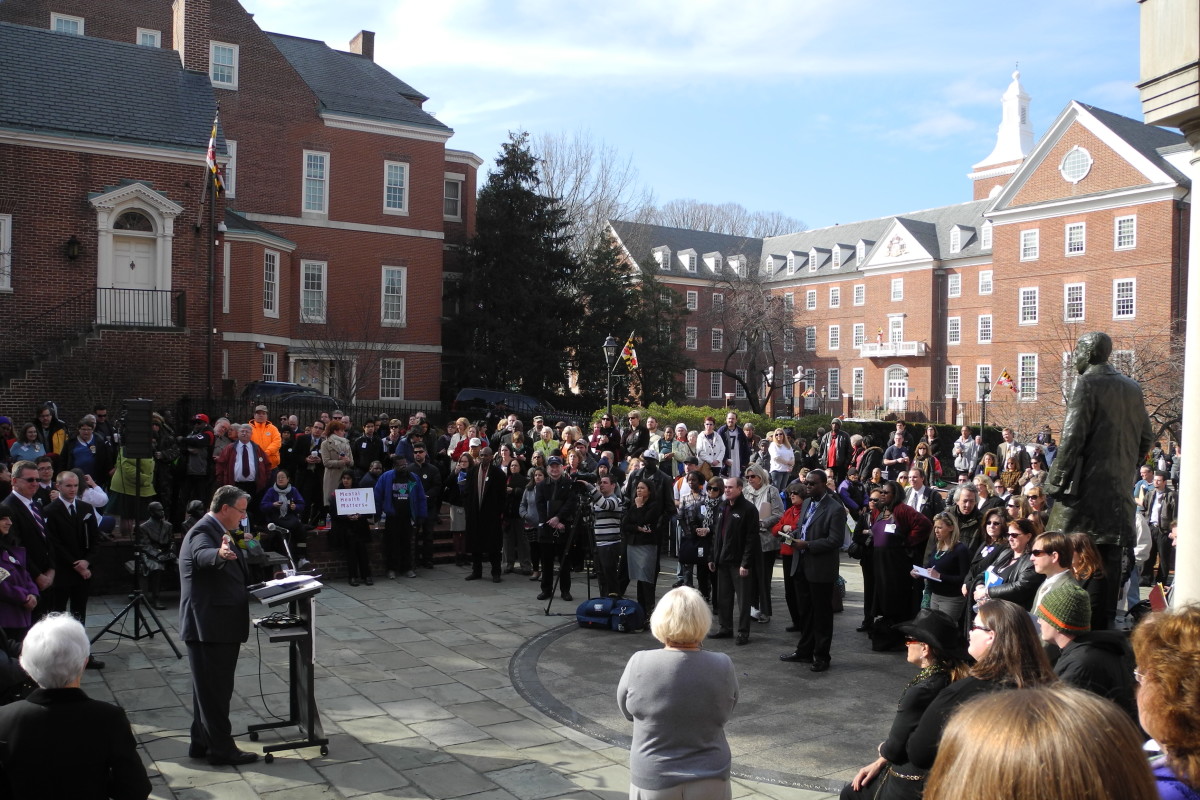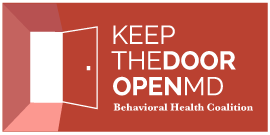
ANNAPOLIS – A coalition of nonprofit organizations announced a campaign to fight state budget cuts and ensure Marylanders with behavioral health needs have high quality and accessible services. Behavioral health is a term that covers the full range of mental and emotional well being, including mental health and substance use disorders. Advocates are asking state lawmakers to “Keep the Door Open” for those that need behavioral health services.
More than one million Marylanders live with mental health issues or substance use disorders and more than 160,000 Maryland children and adults use and depend on the public behavioral health system. Advocates say that demand for services is steadily increasing in Maryland, with the number of people using our public mental health system increasing 65 percent since the start of the recent economic downturn.
Despite the increase in demand, Maryland cut the 2015 budget for behavioral health providers in a January 7 Board of Public Works meeting. The FY16 budget worsens the environment for assisting these vulnerable Marylanders by further cutting support to the behavioral health community in fiscal year 2016. Budget analysts say that the cuts by the outgoing and incoming gubernatorial administrations would reduce support to mental health providers by $23 million.
“At a time when demand is greater than ever before, we are asking providers who treat Marylanders with behavioral health issues to once again ‘do more with less,'” said Dan Martin, director of public policy for the Mental Health Association of Maryland. “Children’s services will be hardest hit by these cuts. We should be opening doors to help for children and families, not going in the opposite direction.”
“One in five children and youth have a diagnosable mental health disorder, but only 20% ever receive treatment,” said Ann Geddes, director of public policy for the Maryland Coalition of Families for Children’s Mental Health. “These kids can’t get access to child psychiatrists. Families have to travel for hours or wait for months to get an appointment.”
“Balancing budgets by cutting community mental health care is counterproductive since such care is a cost-effective alternative to emergency rooms and inpatient beds,” said Herb Cromwell, Executive Director of the Community Behavioral Health Association of Maryland. “What happens when people can’t get medications because providers can’t afford to hire psychiatrists?”
A recent Washington Post poll found that 53 percent of Marylanders oppose reducing payments the state makes to doctors who participate in Medicaid, the state-federal health care program for the poor and disabled.
Maryland’s growing opioid overdose rate has prompted Governor Larry Hogan and several county executives to declare the problem among their legislative priorities. However, funding is needed to provide response services.
“We’re in the middle of a public health emergency in Maryland,” said Dr. Nancy Rosen-Cohen, executive director of National Council on Alcoholism and Drug Dependence – Maryland Chapter. “If we want to help stem this epidemic, we need more residential treatment, recovery support and prevention services, not another budget cut.”
Advocates point out that behavioral health treatment works, and is a good investment. Data from the state’s Behavioral Health Administration’s Outcomes Measurement System led Maryland Department of Health and Mental Hygiene to conclude, “mental health treatment is effective in reducing symptoms and improving functioning for the majority of people who receive treatment.” If Marylanders cannot receive the behavioral health services they need, they often end up receiving costly emergency room services or going without care altogether.
Maryland’s behavioral health budget has been cut three times since January:
- On January 7, the O’Malley administration recommended and the Board of Public Works approved a reduction of the fiscal year 2015 community mental health service rate increase from 4 percent to 2 percent – after many agencies had already provided badly needed staff salary increases.
- The outgoing Administration also proposed a 13 percent cut to Medicaid physician rates effective April 1, 2015, which the Board of Public Works approved. Governor Hogan’s budget extends this reduction through fiscal year 2016. The physician rate cut reduces reimbursement for psychiatrist services for persons using the public mental health system by $685,000 in fiscal year 2015 and by $2.7 million in fiscal year 2016, calling into question the financial viability of frontline outpatient clinics.
- The fiscal year 2016 budget cuts community mental health provider rates by 2 percent and returns them to fiscal year 2014 levels. This would mean that the community mental health rates received no inflationary adjustment in 14 of the last 20 years.
The Behavioral Health Coalition plans a “Keep the Door Open Maryland” rally for February 25 at noon on Lawyers Mall in Annapolis. More than 500 attendees are expected to attend and call for restoration of the recent budget cuts.
Advocates are tweeting about the campaign using #KeeptheDoorOpenMd.
Media Contact:
Chris Trumbauer
The Hatcher Group
410-990-0284
chris@thehatchergroup.com
Contacts:
Herb Cromwell, Community Behavioral Health Association of Maryland 410-788-1865
Ann Geddes, Maryland Coalition of Families for Children’s Mental Health 410-794-6953
Dan Martin, Mental Health Association of Maryland 410-978-8865
Nancy Rosen-Cohen, National Council on Alcoholism and Drug Dependence Maryland 410-625-6482
